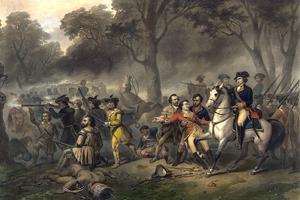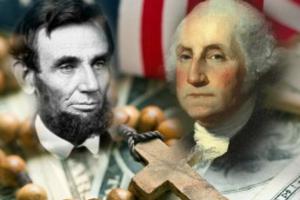Goodbye, George Washington? The Cancel Culture Attacks the Founding Fathers
“May the members of your society in America,” wrote Washington to the nation’s Catholics, “animated alone by the pure spirit of Christianity, and still conducting themselves as the faithful subjects of our free government, enjoy every temporal and spiritual felicity.”

Racism, wherever it exists, is a blight on our culture. All men and women, of all races and nationalities, are created by God in his divine image, and all are worthy of our respect. But what is happening across America, as activists protest the tragic George Floyd killing by defacing our nation’s monuments, is regrettable.
One could make a strong case that some of the statues being spray-painted or hammered (such as the statue of Edward Carmack, a Tennessee politician who wrote pro-lynching editorials and incited violence, or the statue of 17th-century slave trader Edward Colston, which protesters rolled into the harbor in Bristol, England) should be moved from the town square to the local museum. There, viewers could appreciate the artistic excellence, while at the same time acknowledging the weakness of a cultural standard which elevated a segregationist or a slaveholder to a position of prominence in government. There, viewers could come to understand the historical figure as a complex person, full of virtue and vice. But to lop off the head of a statue that tells our story impoverishes our cities and leaves us at risk of repeating the mistakes of the past.
A case in point is the recent vandalism in Baltimore’s Druid Hill Park, where a statue and memorial to George Washington was smeared with red paint. “Destroy Racists” the vandals wrote, following up with the initials for the Black Lives Matter movement.
Helen Raleigh, senior contributor to The Federalist, warned in a recent article: “If Washington and what he stood for can be condemned and humiliated, none of you are safe.” Raleigh, herself an immigrant from China, recalled China’s Cultural Revolution in 1966, which was launched by Chinese Communist Party dictator Mao Zedong. The Red Guards’ destruction of Confucian temples and family cemeteries, Raleigh explained, was fueled by a desire for power — the same desire that motivates the mobs which seek to destroy American cultural artifacts.
“The mob won’t stop,” she writes, “until they destroy everything we hold dear and attain complete power over us.”
Did George Washington Condone Slavery?
The question of whether Washington was racist hinges, for those critics who want his memory expunged from the annals of American history, on his ownership of slaves. It’s true: The founder of our nation did, in fact, “own” slaves; he inherited his first slave at the age of 11 when his father Augustine died, leaving his son a 280-acre farm near Fredericksburg, Virginia, and 10 slaves who worked the fields. Later, as a young adult, Washington purchased several more slaves to help carry out his responsibilities on the farm, but even then he was uncomfortable with the practice. Through his wife Martha, he came to control still more slaves who were bequeathed to her by her first husband, Daniel Parke Custis. Throughout his life, Washington spoke frequently about his desire to end the practice, and in his will enacted in 1799, he granted freedom to all of his slaves.
And even while George Washington stopped short of totally rejecting the slave culture of his time, he did advocate for humane treatment, rather than harsh and indiscriminate punishments. He permitted the slaves on his plantation to decide many things for themselves, including the religious tradition they would follow, and the enslaved population on Mount Vernon were free to join local, organized Christian congregations, or to follow the teachings of a spiritual leader from among their own community.
A Poem in Washington’s Honor – From a Slave
Phillis Wheatley was an enslaved woman who had been brought to Boston from West Africa when she was only 7 years old. Most slaves at the time were not given the opportunity to receive an education, but young Phillis attracted the attention of the daughter of her slaveholders, who taught her to read and write, and gave her a solid education in Greek, Latin and poetry. Wheatley began writing her own poetry at the age of 12 and went on to become the first Black woman in America to publish a book of poetry. In 1775, shortly after George Washington had been named Commander-in-Chief of the Continental Army, Wheatley penned an ode in his honor. Titled His Excellency General Washington, the ode concluded:
Proceed, great chief, with virtue on thy side,
Thy ev’ry action let the goddess guide.
A crown, a mansion, and a throne that shine,
With gold unfading, WASHINGTON! Be thine.
In response to the poem, Washington wrote a letter to the poet, addressing it respectfully to “Miss Phillis.” In March 1776, he invited her to visit him at his headquarters in Cambridge, Massachusetts — although there is no record of their ever having met in person.
Was George Washington a Christian?
Some historians have claimed that Washington was a deist – that is, one who believed that reason and observation of the natural world were sufficient to prove the existence of a Creator, but that one need not belong to an organized religion.
David L. Holmes, author of The Faiths of the Founding Fathers, categorized him as a “Christian deist” because of his frequent references to Providence, which resemble strict deist terminology and yet add the Christian dimension of mercy and the divine nature.
But Westminster Theological Seminary president Peter Lillback, in George Washington’s Sacred Fire, has said of the nation’s first president:
Washington referred to himself frequently using the words “ardent,” “fervent,” “pious,” and “devout.” There are over one hundred different prayers composed and written by Washington in his own hand, with his own words, in his writings. ... Although he never once used the word “Deist” in his voluminous writings, he often mentioned religion, Christianity, and the Gospel.... Historians ought no longer be permitted to do the legerdemain of turning Washington into a Deist even if they found it necessary and acceptable to do so in the past. Simply put, it is time to let the words and writings of Washington’s faith speak for themselves.
And the late Catholic philosopher Michael Novak, author of On Two Wings: Humble Faith and Common Sense at the American Founding, said of Washington that he could not have been merely deist, without also being a Christian. Novak wrote:
What we did prove, and quite conclusively, is that Washington cannot be called a Deist – at least, not in a sense that excludes his being Christian. Although he did most often address God in the proper names a Deist might use — such as “Author of all the good that was, that is, or that will be” and “Disposer of all human events” — the actions that Washington expected God to perform, as expressed both in his official public prayers (whether as general or as president) and in his private prayers as recorded, are the sorts of actions only the God of the Bible performs: interposing his actions in human events, forgiving sins, enlightening minds, bringing good harvests, intervening on behalf of one party in a struggle between good and evil (in this case, between liberty and the deprivation of liberty), etc. Many persons at the end of the 18th century were both Christians and Deists. But it cannot be said, in the simpleminded sense in which historians have become accustomed to putting it, that Washington was merely a Deist, or even that the God to whom he prayed was expected to behave like a Deist God at all.
Washington’s Letter to Catholics
Washington penned a letter to Catholics in 1790, thanking them for helping to elect him to the presidency in 1789 and promising the protection of civil government. Here is the text of that letter:
While I now receive with much satisfaction your congratulations on my being called, by an unanimous vote, to the first station in my country; I cannot but duly notice your politeness in offering an apology for the unavoidable delay. As that delay has given you an opportunity of realizing, instead of anticipating, the benefits of the general government, you will do me the justice to believe, that your testimony of the increase of public prosperity, enhances the pleasure which I should otherwise have experienced from your affectionate address.
I feel that my conduct, in war and in peace, has met with more general approbation than could reasonably have been expected and I find myself disposed to consider that fortunate circumstance, in a great degree, resulting from the able support and extraordinary candour of my fellow-citizens of all denominations.
The prospect of national prosperity now before us is truly animating, and ought to excite the exertions of all good men to establish and secure the happiness of their country, in the permanent duration of its freedom and independence. America, under the smiles of a Divine Providence, the protection of a good government, and the cultivation of manners, morals, and piety, cannot fail of attaining an uncommon degree of eminence, in literature, commerce, agriculture, improvements at home and respectability abroad.
As mankind becomes more liberal they will be more apt to allow that all those who conduct themselves as worthy members of the community are equally entitled to the protection of civil government. I hope ever to see America among the foremost nations in examples of justice and liberality. And I presume your fellow-citizens will not forget the patriotic part which you took in the accomplishment of their Revolution, and the establishment of their government; or the important assistance which they received from a nation in which the Roman Catholic faith is professed.
I thank you, gentlemen, for your kind concern for me. While my life and my health shall continue, in whatever situation I may be, it shall be my constant endeavor to justify the favorable sentiments which you are pleased to express of my conduct. And may the members of your society in America, animated alone by the pure spirit of Christianity, and still conducting themselves as the faithful subjects of our free government, enjoy every temporal and spiritual felicity.
G. Washington
- Keywords:
- george washington

















